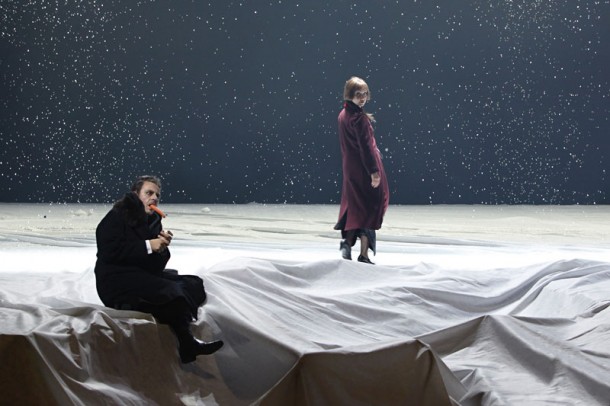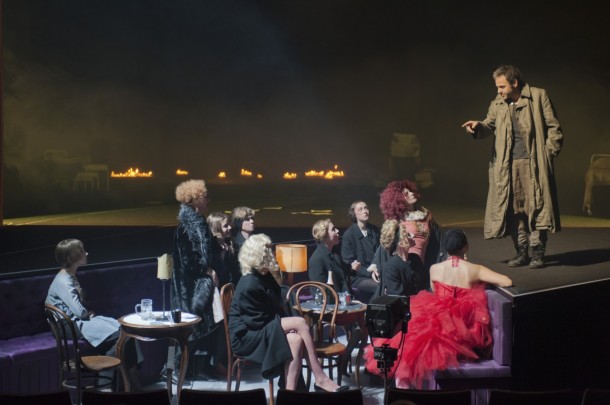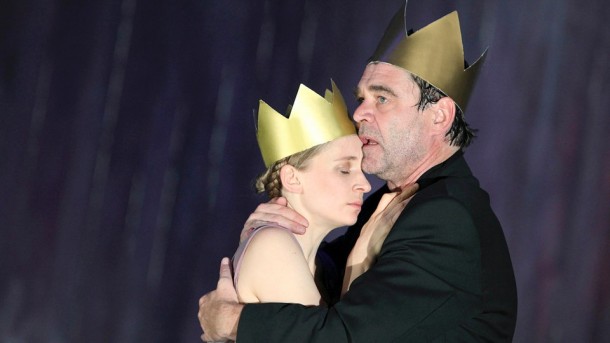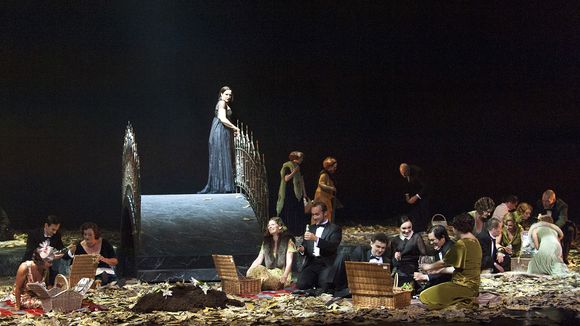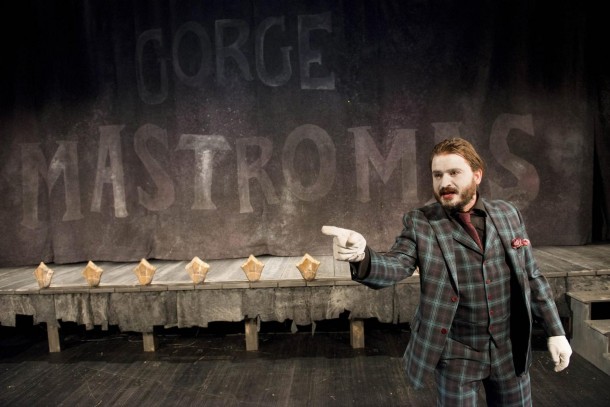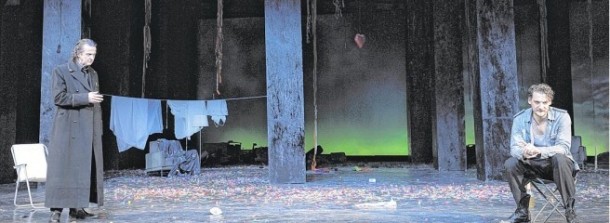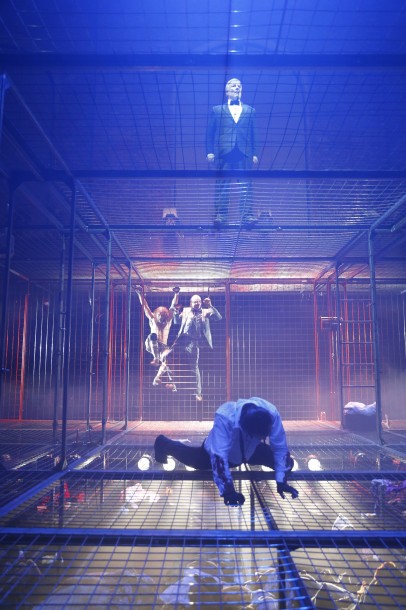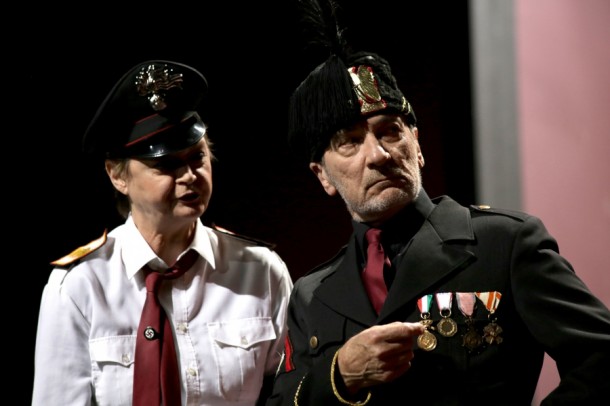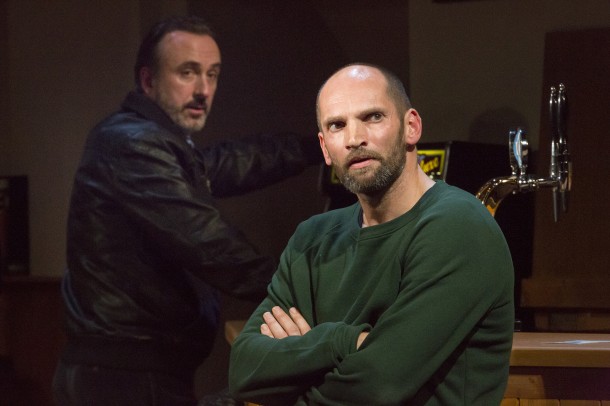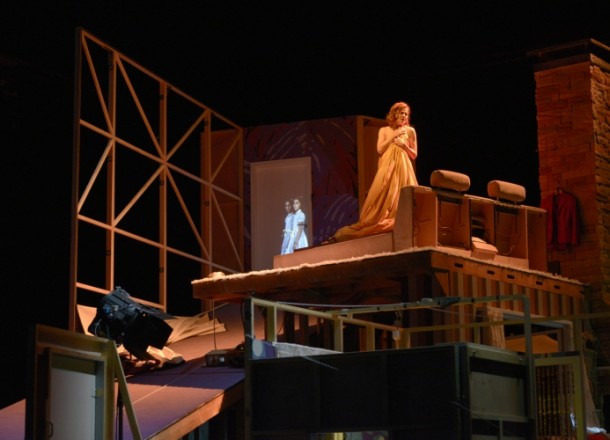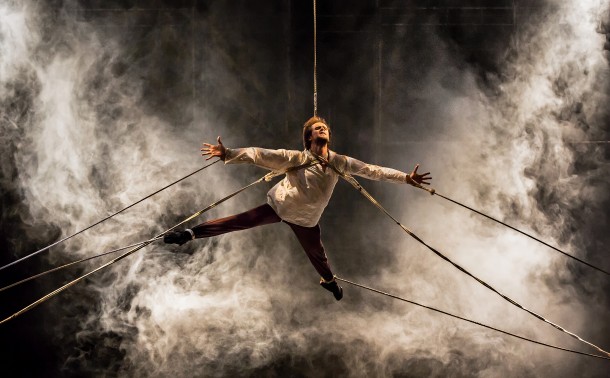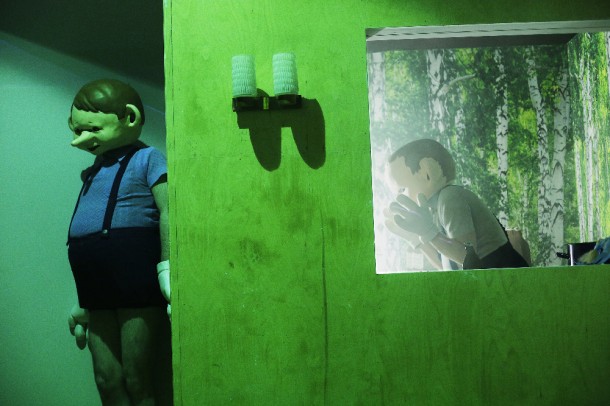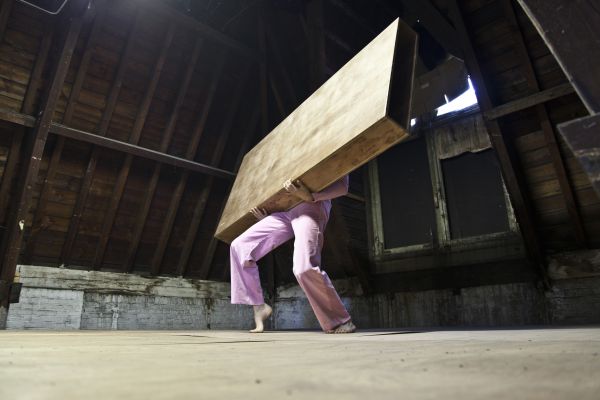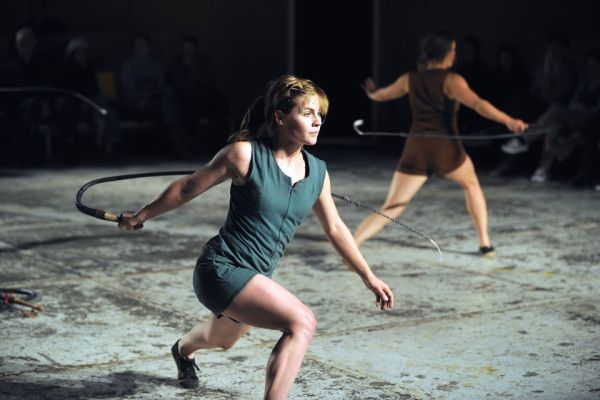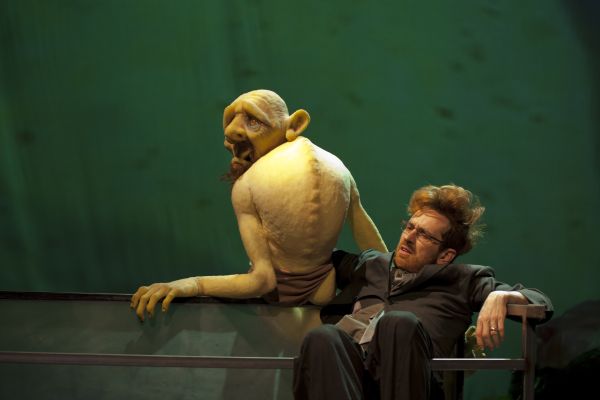Luc Bondy and Ödön von Horváth
It is 1918. No less than 7,000,000 (two thirds) of the 11,000,000 Germans conscripted to fight in the “Great War”—could there be a more inappropriate epithet?—are dead, wounded, or missing. An air of helpless melancholy hangs over a group of women, aging soubrettes in a Berlin variety theatre, when a filthy, unarmed soldier enters lethargically, as if shell-shocked, in search of a woman he once loved and left. Thus begins Ödön von Horváth’s rarely played drama Don Juan returns from the War, written in 1936, just three years before the author’s death in a tragic accident in Paris.
Many hundreds of plays have been written about the legendary libertine Don Juan, from the version by the Spaniard Tirso de Molina, via Molière’s unforgettable masterpiece, to plays by the likes of Carlo Goldoni, Alexandre Dumas, and George Bernard Shaw, all the way down to the Nobel prize-winner Josè Saramago (Don Juan or the Dissolute Acquitted, 2005), and Patrick Marber’s Don Juan in Soho (a 2006 update of the Molière version): not to speak of the countless opera librettos, epic poems (Byron), and films made around the legend. The fascination of sex, and, in Don Juan’s case, excessive sex, seems irresistible.
Given the fact that so many single and widowed women were competing to win the few available, unscathed war veterans in 1919, we might reasonably have expected that Horvath would offer us a series of exploitative, erotic adventures. But Horváth’s Don Juan, although still not adverse to casual sex, is less interested in amorous escapades than in finding the woman with whom he once “sinned,” and with whom he has now lost touch. Compared to the memory of his lost love, all other women pale into anonymous bodies to be consumed as one-night stands rather than as a prelude to a long-term relationship. Indeed, many of Don Juan’s encounters with the women in the play—Horváth’s cast features one man and twenty-nine women—occur more as a result of his search for a bed than for sex. Scarcely has Don Juan begun to find his bearings, in a city full of women lining up for food rations, warmth, and shelter, than he falls prey to an epidemic of influenza which weakens him even further. And when he does find his old lover’s address, he learns that she has moved away long ago. Unknown to him, however, his letters have been sent on to her new home in a small provincial town where they are read by her grandmother and the family maid. Don Juan’s long-lost love has died two years before the end of the war in mysterious circumstances, and her grandmother is bitterly waiting to come face to face with the man who ruined her life. Meanwhile, in a Berlin now plagued by economic inflation, Don Juan passes himself off as an art dealer, rents a room in the house of an impoverished professor’s widow with two daughters, meanders listlessly through the night spots, and has casual sex with women who remind him in some way or other of the woman he is looking for. Just as the war has torn limbs from bodies, so Horváth seems to be indicating that his protagonist is vainly attempting to reassemble those bodily parts, which remind him of the woman he is seeking, in a vain attempt to unite himself with her once more. Toward the end of the play he discovers her address and sets out in winter to find her house, deep in the countryside. On his arrival, however, the grandmother reveals that her granddaughter never lived to read his remorseful letters and learn of his wish to make a new start. The maid leads him to a nearby grave through the snowy night. Here we learn that the dead woman did not commit suicide but lost her mind and died in a lunatic asylum. Don Juan sinks into the snow, huddled beneath an increasing blizzard, and bids farewell to his dead bride. The maid warns him not to stay too long and takes her leave with an “Adieu, snowman!” as if she senses she will never see him again. Luc Bondy’s sensitive, finely nuanced production ends with a moment of dark humor when a passing child sticks a carrot in the frozen mouth of the solitary mourner.
Bondy, who is the artistic director of the Odéon theatre in Paris and former director of the annual Vienna Festival, is one of a dying breed of directors in Germany who dedicate themselves to psychologically precise, character-based explorations of an author’s text rather than using a play to display their own egos and current obsessions. Most of the reviews of his production at the Berliner Ensemble commented unfavorably on how old-fashioned the production was. I found it deeply moving in its precision, its densely atmospheric rhythms, its flashes of ironic humor, and its subtle exploration of the many different women characters (played exquisitely by a cast of eleven, in particular the glorious Ilse Ritter, Ursula Höfner-Tabori, Kathrin Angerer as the widow and the maid, and the imposing Svetlana Schönfeld as the grandmother). Samuel Finzi’s Don Juan is an intricate, extraordinarily understated, finely graded study in traumatized apathy. Reading the text in the bulky BE program afterwards, I had the impression that, on the night I saw him, he was at times a little too withdrawn and inexpressive. That said, Horváth’s character is at heart a hollow exhausted shell, and Finzi’s unforgettable portrayal is infinitely preferable to the grimacing, exaggerations which tend to dominate the great majority of performances in contemporary German theatre. Most uniquely of all, for a play set in the years following the First World War, Bondy refrained from falling back on video clips, a knee-jerk nod in the direction of “contemporary” interpretation aesthetics regarded as indispensable in ninety-nine percent of the productions I have seen in the last year. Like all the best directors, Luc Bondy allows us to listen to the characters, follow the storyline, observe the action, absorb the atmosphere, and use our imagination rather than bombarding us with a rapid succession of superficial external sounds and images.
Bondy’s initial theatrical training was with Jacques LeCoq in Paris. But since 1969 his directorial career has been mainly based in Germany and Austria, with a few excursions into England at the London Young Vic Theatre. In 1985, following Peter Stein’s surprise resignation, he became one of the directorial team at the Berlin Schaubühne, where he remained until 1992. Since then he has divided his time between directing plays and opera (mostly in Salzburg but also in 2009, Tosca at the New York Met).
Wolfgang Engel’s Macbeth
Another of the older generation of theatre directors is the seventy-year old Wolfgang Engel. In contrast with Bondy, he is a product of the former GDR where his career flourished in his years at the Dresden State Playhouse in the 1980s and 90s.
In Essen, Engel opened the 2013/14 season with a production of Shakespeare’s Macbeth. This proved much more of a challenge, since Engel chose to present the play more as a chamber study in human relationships than an epic narrative of ambition and power politics. The set, by Andreas Jander, spoke volumes: a large cube made of diagonal strips of timber, which seemed to form a cage within which the characters were trapped. The extremely cool setting was not helped by an almost complete absence of lighting effects to provide some atmosphere. Thus, we were thrown back almost completely onto the characters—in particular, the two Macbeths. Jens Winterstein, as Macbeth, had both the physical presence and age necessary for an imposing battle-hardened soldier, had these not been belied by his silly kilt and even more ridiculous cardboard crown. To make things even more difficult, Engel chose to present Macbeth’s fate more in terms of his pathological imaginative faculties than his thirst for power, fired by the witches’ three-fold prophesy, which appears to guarantee him certain success. When the first two prophesies prove to be true, the truth of the third would almost seem to be inevitable. Thus, the focus of the play retreats from the external action to the internal workings of a man suffering from an excessively guilt-ridden conscience, and the production shrinks from an epic tragedy to a chamber play. This might be fine, where it not for the fact that all the naked passion and emotional panic seemed to have been sucked out of the character and replaced by cold-blooded, analytical contortions. Nor was this Macbeth helped by his Lady, played by Sylvia Weisskopf, who seemed to have confused her role with that of Ophelia. Whereas Lady Macbeth is a mature, ruthless, calculating figure, prepared to sacrifice everything for what she wants, Ms. Weisskopf presented her as a fluty-voiced adolescent whose idea of sexual power was embodied in her jumping into her husband’s arms with her legs around his waist to greet him on his return from the battlefield. Thus, when Macbeth breaks the news to his wife that he has decided not to proceed with their plan to kill Duncan, Ms. Weisskopf’s scourging mockery lacks all the weighty scorn and erotic blackmail necessary to make us believe in his decision to make a U-turn and pledge himself to the murder once more. Never for a moment could I believe that this was a woman who “had given suck” and would have torn her child from her breast and dashed its brains out against a wall, had she sworn to do so. So in the great sleepwalking scene, which Ms. Weisskopf heroically played naked, as if she was trying to cleanse her whole body rather than just her hands, she came over more like a traumatized adolescent who had been the victim of a violent rape than a middle-aged woman crazed by the guilt of her own crimes.
In the end, Wolfgang Engel’s bias toward intellectual reasoning at the expense of naked passion drained the play of its emotional power and reduced it to a rather unsuccessful study in personal, psychological problems. Nor was the production helped by the costumes of Zwinki Jeannée, which seemed to move arbitrarily between centuries and styles: whereas the Scots were clad in a mix of medieval garb with kilts, the English were dressed up in rather more modern, aristocratic suits, and even boasted a ridiculous-looking contemporary guardsman complete with a pristine red uniform and a black, bushy busby. Furthermore Macbeth as King was given a golden, cardboard, cut-out crown, a “gag” (if it was meant as such—”all rulers are clowns?”) that was repeated at the end of the play when the young King Malcolm was presented with a crown which is far too big for his head. The unsuccessful hodgepodge of styles was made even more ridiculous by the fact that old King Duncan was portrayed as an invalid staggering around the stage on his last legs with the help of a twentieth-century walking frame. Given his state of health as portrayed in this production, Macbeth could have avoided the necessity to murder him simply by asking his wife to wait a few hours for the old dodderer to pass away of his own accord.
Verdi’s Macbeth at the Aalto Opera
Scarcely a mile away from the Grillo Theatre lies the imposing Aalto Opera House, which in the past few years, under its Intendant Stefan Soltesz, has made a name for itself as one of the most renowned opera venues in the whole of Germany. Soltesz departed his post in summer 2013 to be succeeded by the former artistic director of the Netherlands State Opera in Amsterdam, Hein Mulders. Whether by chance or design, Mulders too chose to launch his regime with a production of Macbeth, this time by the nineteenth-century composer Giuseppe Verdi. Not being a great fan of opera, but suspecting Verdi could provide the fire and passion lacking in the theatre production I had seen down the road, I decided to swallow my reservations in the hope of a pleasant surprise. Verdi’s attitude to the opera was that it should neither be political nor religious, but “fantastic.” He even composed a prose draft of Shakespeare’s masterpiece before handing it over to his librettist with the instructions to cut out all superfluous material and keep it “brief and sublime.” The problem here is that the Macbeth story is anything but sublime, but a series of brutal, (self-) destructive episodes. And although Verdi clearly loved the play and even preferred this opera to all his other works, he was unable to transcend his own artistic tendencies to present everything in terms of rich melodies, marches, and dances. Indeed when he revised the opera in 1865, he even added a ballet scene (!) not included in this production, thank the Lord! At the heart of the opera is the contradiction between the material and the form. Thus, Verdi presents the witches’ opening meeting on the heath in gloriously melodic harmonies, thereby draining the atmosphere completely of any murderous threats. And so the opera staggers on in a similar vein to its inevitable conclusion. The director David Hermann intermittently strove to bring us back to brutal reality with the image of blood-stained children’s corpses, but he was not helped by a design, which ranged from a decorative golden bridge that might have come straight from a Venice canal, and a huge symbolic uprooted tree trunk that hung prominently over the stage. And in keeping with operatic convention, all the characters, especially Lady Macbeth, were clad in impeccably expensive robes, which only served to emphasize the harmless unreality of the venture. The singing was impeccable, if not to say “sublime,” but what was the point of it all?
Dennis Kelly in Essen
Back in the Grillo Theatre, I was lucky enough to see a production of a contemporary English play, which only two weeks before had had its English premiere at London’s Royal Court Theatre. This was The Ritual Slaughter of Gorge Mastromas, by the dramatist Dennis Kelly, best known for his West End and Broadway adaptation of Roald Dahl’s Matilda. Kelly’s play about cut-throat capitalism is posited on the question of what motivates our sense of morality: is it goodness or cowardice? The play opens with an outline of Gorge Mastromas’s life from the cradle to the moment when he is faced with the decision to stay “good” and unsuccessful or take what he can get, destroy other people, and lie his way to the top, irrespective of any moral scruples. Kelly’s model here seems to be that of the multimillionaire, marketing-impresario, and art collector, Charles Saatchi who once put it: “Be the worst you can be. Life’s too long for patience and virtue.”
Whereas in London the opening narration was divided among a chorus of seven seated on chairs facing out front, the director of the production in Essen, Thomas Ladwig, elected to hand over the narration to a single character, a cynical, music-hall impresario, white-faced and bearded, complete with a lurid checked suit from which he tosses handfuls of golden confetti at regular intervals. The extremely long exposition (at least half an hour) might easily have been tedious where it not for a riveting virtuoso performance by Daniel Christensen as Pete, a character simultaneously entertaining and cynical, challenging us to revise our views of “right” and “wrong.” Unfortunately, once the production reverted to a quasi-naturalistic level on a tawdry stage, it lost its unpredictable elements with the result that the evening became little more than a denunciatory illustration of the negative effects of capitalism. Whether this had anything to do with the fact that the version shown in Essen was at least an hour shorter than that in London, I cannot say. Nonetheless, Ladwig had the cool, good sense to keep the theatrical denunciation toned down, and the cast of four presented us with a highly enjoyable spectacle without allowing us to leave the theatre with a feeling of self-satisfied superiority. This might not be the best of Dennis Kelly—and the London reviews were generally lukewarm—but the play was far better than anything I have witnessed by contemporary German dramatists in the previous twelve months.
David Bösch’s Othello
The Bochum Playhouse is just a few miles up the road from Essen, and in the last edition of European Stages I reported on an interesting, if not entirely successful production of Carl Sternheim’s trilogy on the rise and fall of a middle-class family there. This season I was curious to see a new production of Shakespeare’s Othello for two reasons. On the one hand, there has been considerable controversy in recent months in Germany about “black-facing” white actors in “black” roles: Germany’s main immigrant population comes not from Afro-Caribbean areas but Turkey, and Turkish actors are not often seen on stage, even though Shirmin Langhoff’s new regime at the Maxim Gorky Theatre in Berlin is making a brave attempt to break this trend. On the other hand, the production was in the hands of David Bösch, who seems to enjoy a cult following among many theatregoers, and I was interested to see if he was indeed the “star director” he was claimed to be. His production of Othello opened with a movie projection on an empty screen informing us that we were about to be shown “The Tragedy of Othello…and Desdemona,” complete with a pink heart and sentimental music. The program had already warned me that the play would be shown in a cut version (two hours twenty minutes including an interval), with a cast of six, none of whom would be doubling. If the production were to be at all successful, it was clear that some themes in the play—if not to say whole scenes—would have to be cut. Here the play did not open with the news of Othello’s marriage to Desdemona but showed the two embracing at what appeared to be a honeymoon party: he, a middle-aged white man in a smart black suit and she, a young white woman in a traditional white wedding dress. Thus, from the very start, the racial element was banished completely, as was to a great extent the political and military element with which it is entwined in Shakespeare’s text.
Bösch had clearly decided to turn this into nothing more than a love story doomed to collapse as a result of the Mephistophelian chicanery of Othello’s right-hand man Iago, played with satanically appropriate relish by Felix Rech. Indeed, at one point this Iago departs from Shakespeare to give us some lines from Verdi’s opera of the same name: “I am a criminal because I am a person and feel the dirt from my own origins within me… God is a comedian and a scoffer both inwardly and outwardly… But what follows all this scoffing? Death! And then? Nothing follows death! The world beyond is a fraud.” To my mind, to play the role of Iago with such conscious villainy robs his revenge of any dimension of moral self-justification and turns his actions into evil for evil’s sake. For this Iago is anything but a charming, outwardly honest adjutant. Watching the show, I was forcibly reminded of my days as an acting student in the Drama Centre London when one of my teachers told us that very few, if any “bad people,” like Iago, believe that they are bad and, if asked, would claim that they were acting only from the best of motives. Another problem for me was that the modern-dress production seemed to have no sense of place. We were clearly in a hot climate because at one point Desdemona showed up in a khaki shirt and shorts complete with binoculars as if she was on an African safari. And the various, luridly-colored suitcases scattered about the set only reinforced the impression that the happy pair were revelling in a carefree honeymoon in the Mediterranean, rather than caught up in the middle of a military conflict. If we add to this a thoroughly ludicrous, deliberately clown-like interpretation of Shakespeare’s “Venetian gentleman” Roderigo, a young naïve Emilia who for some reason played the accordion, and the—for German directors almost compulsory—rendering of an English pop song by Desdemona, it is clear that David Bösch was aiming his production at a young audience. This was “Shakespeare light,” a comic-strip version of a tragedy, almost completely lacking in pain. Disembowelled of any social, racial, and political content, this Othello was little more than a pallid echo of Romeo and Juliet. If all that interested Bösch was the romantic element, why did he not choose to direct the latter?
The Tempest in Recklinghausen
Shakespeare was to show up yet again at this year’s festival in Recklinghausen, whose theme was “Island Kingdoms—Land in Sight.” The program, devised by the artistic director Frank Hoffmann and his team, promised audiences a series of exciting theatrical discoveries from islands like Ireland, Great Britain, Iceland, Sicily, Japan, Australia, the Caribbean, and the Iberian peninsula. True to its motto, the festival kicked off with a twofold “island” in the form of a production of The Tempest, directed by a young, prize-winning director from Iceland named Gisli Örn Gardasson. In 2011, Gardasson and his company Vesturport, from Reykjavik, were awarded the European Theatre Prize by the European Commission for New Realities in the Theatre. Gardasson seemed to have imported his complete backstage team (design, costume, lights, and music) for this production from the Residenz Theater in Munich, and, if nothing else, they did indeed give Shakespeare’s final play a new reality. The figure of Prospero is often seen as the prototype of Renaissance humanism. Dethroned by his brother Antonio, he is subsequently sent out to sea with his three-year old daughter Miranda and washed up on an island full of weird creatures. Now, twelve years later after a storm at sea, the tables are turned. Antonio is shipwrecked on the island and Prospero is given the opportunity to take his revenge. In Shakespeare’s version, he changes his mind, Mandela-like, and opts for reconciliation as the only way to lasting peace. By contrast, Gardasson’s ninety-minute version shows us a Prospero intent on vicious reprisal for the wrongs done to him in a celebration of suffering, reminiscent of Nietzsche’s dictum that the origins of conscience, guilt, and duty can be found in festive cruelty and that such origins are “like the beginnings of everything great on earth, thoroughly and enduringly soaked in blood.”
Here Prospero’s cell, indeed the whole island (shades of Guantanamo) is enclosed in steel, a single three-story prison in which torture can be and is practiced at any moment. Even Miranda seems to be caught in a narrow cell between two iron bars. Caliban and other prisoners crawl around in a maze of cells beneath Prospero’s feet, while above his head, other creatures like Ariel appear through the haze of stage fog infused by backlighting. Miranda’s love of Ferdinand even flies through the air across the stage at one point. This production is all full of action, but, in the plethora of (Star Wars or Matrix?) references, Gardasson forgets one simple theatrical maxim—to tell the story in such a way as to allow the audience to follow the events. Here the text has been cut so radically that the characters are almost impossible to identify, and even the most ardent Shakespeare connoisseurs would have had difficulty in finding their way through the relentless mass of sound and fury. There is plenty of violence, much of it slapstick, but the relationships between the characters are so sketchy as to make them almost non-existent. Thus, most of the cast, including the hapless Prospero, played by Manfred Zapatka, are reduced to static, out-front declamation within the hectic action. It might be true that Shakespeare’s play ends in an almost unbelievable utopian vision and that his vision has nothing to do with the contemporary world of violence and revenge. The problem with Gardasson’s version is that it ends where it starts: with revenge. Here no one is freed, neither Ariel played by Gunther Eckes, whose final appearance is as a drag- avenging angel in a long white gown, nor Ferdinand, who is cut to pieces, nor even Miranda who retires in speechless trauma to her lonely cell. For all his cruel triumphs, Prospero remains a tragic figure trapped in his own philosophy of violence, where everyone’s “ending is despair” unrelieved by prayer. Thus, his final plea to the audience, “As you from crimes would pardon’d be /Let your indulgence set me free”—comes over not only as hopeless but hollow.
Pirandello’s Henry IV
A few days later, the Recklinghausen Intendant, Frank Hoffmann moved us to Sicily with his own highly idiosyncratic interpretation of Pirandello’s Henry IV. Luigi Pirandello was one of the great pioneers of twentieth-century European theatre. His main theme was the relationship between illusion and reality, not only in the theatre but in real life. In this he was widely influenced by the work of Sigmund Freud and, on a personal level for the last seventeen years of his life until he died in 1936, by the tragic destiny of his beloved wife Antonietta, who was committed for life to a mental home in 1919. Pirandello’s acknowledged masterpiece, Six Characters in Search of an Author, is still in the repertoire of many European theatres today. Henry IV, by contrast, is rarely performed. It deals with an Italian aristocrat whose real name is never mentioned in the play. Twenty years previously he had taken part in a masked cavalcade, in which he was disguised as the Emperor Henry IV (1050-1106). The aristocrat had chosen this role because the young lady, whom he loved, had elected to play the role of Duchess Matilda of Tuscany, and he wanted to lie at her feet like Henry IV at Canossa. But during the procession, his horse reared, he was thrown from his saddle and cracked his head on the street. When he came back to consciousness, he believed that he really was Henry IV, and since then all the persons in his surroundings have been confirming him in his madness by wearing medieval costumes and treating him as if he really were the Emperor.
When the play opens, he is visited by a group of old friends in the company of a doctor who wishes to shake him out of his “madness” and back into “reality.” What they do not know, however, is that “Henry IV” has long since recovered his sanity and has simply been playing the part of the Emperor. The play comes to a climax when “Henry” comes into conflict with one of his visitors and kills him. His only way to avoid being convicted of murder is to return to his role as a “madman.” Reading the play now it seems utterly overloaded with historical information and psychological musings. Which of us can honestly say that we know a lot about the conflict between the head of the Holy Roman Empire Henry IV, his power struggle with his former ally Pope Gregory VII, and his subsequent humiliation at Canossa? Frank Hoffman was clearly well aware of this problem when he chose to revive the play: he therefore elected to update Pirandello’s dramatic framework and substitute the figure of Henry IV with Mussolini on the grounds that Pirandello wrote the play in 1921 when he joined the Italian Fascist party at the start of Mussolini’s dictatorship. Having made this decision, Hoffman was then, of course, forced to substitute all of Henry IV companions with contemporaries of Mussolini. Thus, one of them has to play the role of the wife of King Victor Emmanuel III, another that of Mussolini’s Foreign Minister Count Galeazzo Ciano, and a third that of the Futurist artist and writer Fillippo Tomaso Marinetti.
Most prominently of all, Hoffmann substitutes the woman who was the Pope’s intermediary, Matilda of Tuscany, with the figure of Hitler’s Nazi film director, Leni Riefenstahl, who clearly fascinated Mussolini. The trouble with this decision is that it creates as many problems as it wishes to solve since, apart from Leni Riefenstahl, most viewers are entirely ignorant of the other historical characters, and to make matters even more confusing, Hoffman retained the title of the original play instead of renaming it Mussolini (after Henry IV). This might all have been thoroughly acceptable were it not for the production itself, which, in its desire to throw off the debating-club atmosphere of the original, gets lost in superfluous interludes like a drunken, dance party, spectacular lighting and design tricks—at one point a complete wall collapses, leaving us with a self-referential image of Futurist fragmentations—and a series of hectic, superficial performances, which made it well-nigh impossible for us to distinguish the “real” characters in the play from the characters they were “playing” for the benefit of “Mussolini.” As one spectator said to me at the end of the play, the only thing real about it was the horse chomping straw in the opening sequence and walking across the stage at the end.
McCafferty’s Quietly
The disappointments of the first two major productions in the festival were more than compensated for, however, by a new Irish play presented by the Abbey Theatre of Dublin. Quietly, a prize-winning play by Owen McCafferty, has all the virtues of a dramatic plot accompanied by top-class acting and directing. Although I could have easily done without the typically Anglo-American obsession with a one-hundred percent, naturalistic set, I was happy to go along with Alyson Cummins’s precisely realized backstreet Belfast pub, populated at the start by a lonely, Polish- immigrant barkeeper caught between texting SMSes to his pregnant Irish wife and his Polish girlfriend and the background commentary of a televised international football match between Northern Ireland and Poland. The subdued opening soon takes on a tense quality with the arrival of a Catholic working-class man, Jimmy. Despite his half-hearted banter with Robert, we sense from the start that Jimmy is wound up to the point of explosion when he mutters a warning, “there’s a man coming in later on to see me… there might be a bit of trouble with him.” Indeed there is. For Ian, the man who has arranged to meet him, is a Protestant. Ian has asked for the meeting because he wishes to straighten himself out by confessing a horrendous crime which he committed in 1974 at the age of sixteen. In order to prove himself a man, he had let himself be talked into tossing a bomb into a Catholic pub during a televised football match, thereby murdering six men, one of whom was Jimmy’s father.
Each of the men tell their stories in graphic detail, and emphasize how it has affected the rest of their lives. Jimmy’s reward for his act of Orange “heroism” against the “Fenian bastards” was to be able to take his pick from a group of girls, one of whom he can lose his virginity with a backyard quickie. Now he is torn with remorse, not only with the consequences of his terrorist act, but also with the knowledge that the girl he “had” became pregnant and as a result was forced to travel to England for an abortion. His only excuse for his terrorist action was that he was “only sixteen, just a boy,” which simultaneously rings feeble and utterly convincing. Jimmy, who was down the road at home at the time of the explosion, recounts how he ran into the shattered remains of the bar room to witness the bloodstained remnants of the dead victims, one of whom seemed to be unaccountably lying untouched and peacefully asleep, and his desperate search for his father who appeared at first to have disappeared, but whom he then identified solely from a torn-off leg in the trousers which had been blown from his body. Thirty-six years later, both men remain traumatized by their experiences as perpetrator and victim. Ian, plagued with a compulsion to confess his guilt and be forgiven, is portrayed with moving precision by Declan Conlon, while Patrick O’Kane’s interpretation of the dangerously unpredictable Jimmy is an object lesson in acting at its best: specific, detailed, deeply felt, and intensely portrayed without a hint of false histrionics. Indeed, the tensions between Conlon and O’Kane had a “here-and-now” immediacy far transcending the customary rehearsed exchanges between actors, and this is what made the evening so outstanding.
The two were more than adequately supported by Robert Zawadski as the wary, watchful, Polish barkeeper, whose well-contrasting restraint only served to highlight the underlying potential for violence. In the end, the two antagonists overcome their ingrained hostility with a short unconvincing handshake, which O’Kane breaks off as if he has been shot through with a blast from a high-tension cable. A start has been made to an ongoing period of reconciliation in a conflict which will take decades to heal. But McCafferty is too clever a dramatist to leave it at that. After the two men depart and the football match between Northern Ireland and Poland comes to an end, we hear the sound of drunk and rowdy supporters outside the pub chanting anti-Polish slogans and a stone crashes against the window outside. Robert arms himself quietly with a baseball club as religious hatred renews itself in the form of xenophobia. Seen purely in terms of the plot—a re-rehearsal of the long-standing resentments between Protestants and Catholics in a Northern Irish pub—Quietly could easily have been little more than a cliché. But the combined talents of the author, the director, and the three characters ensured that this was a deeply moving and highly painful reflection of an ineluctable truth. Indeed, this was quite the best new play I have seen for many years.
Jan Bosse’s Scenes from a Marriage
I was expecting another highly painful evening in an adaptation of Ingmar Bergman’s film, Scenes from a Marriage, directed by Jan Bosse from the Stuttgart Playhouse, another two-hander featuring the wonderfully talented Astrid Meyerfeldt and Joachim Król. But whereas Bergman’s film about the breakup of a relationship was a tortuous and torturous three-hour litany of Nordic soul-searching, Jan Bosse chose to look at it from an ironically humorous angle. Whether this says something to us about the reluctance (or inability?) of German directors to get to the painful bone of a relationship, as in Quietly, I hesitate to say. But my experience of both working with and viewing actors in Germany has always been colored by a frustration that they seem terrified of touching their own emotions, with the result that they can only “perform” them rather than relive them on stage. This is not to detract from the extremely skillful and utterly entertaining characterizations of Meyerfeldt and Król, only to say that there seems to be a fundamental difference in the approach of Germans and Anglo-Saxons to the art of acting. This show was rehearsed and performed to perfection, but it was its very perfection which made its spontaneity feel rehearsed. Nonetheless, in comparison to the vast majority of German productions I have seen over the last ten years, this was one of the most outstanding.
Eifman’s Beyond Sin
The productions at Recklinghausen are always a fascinating, eclectic blend of typical festival fare dotted with more challenging stuff. The final production I saw this year was a stunning mixture of the two: Boris Eifman’s ballet company with a production of Beyond Sin, an adaptation of Dostoevsky’s The Brothers Karamazov, and a true mix of genres, in that it was a dance interpretation of a dramatic adaptation of a novel, all played to music with the intermittent addition of voice-over dialogue. I read this massive novel years ago and was bowled over by its narrative drive, its structural and moral ambitions. Eifman miraculously captured the essence of the original by showing the three brothers inextricably tied into the sins of their father, Fyodor, an immoral drunken lecher. Alyosha, the youngest of the brothers, attempts to untie the knot which binds them all. The scandalous behavior of his father and two brothers—danced with a furious energy by the whole cast—is broken up intermittently by periods of lyrical harmony that then flames up into even harsher conflict. When Dmitri gets into a fight with his father for the hand and body of Grushenka, the conflict ends in the death of Fyodor. Although he is innocent of the murderous act, Dmitri is condemned and sent to prison. At the start of the second act, Ivan and Alyosha conduct a long discussion about the meaning of life and the soul. This is not only danced but mediated to the audience by voice-overs. The discussion is gradually embodied by the dancers in the story of the Great Inquisitor and Jesus. Where does our salvation lie? In surrendering ourselves body and soul to religion, as the Inquisitor (Ivan) maintains, or in the freedom of the heart and soul as claimed by Jesus (Alyosha)? In the end, Alyosha can no longer stand the sight of suffering and releases all the inhabitants of the “house of the dead.”
But instead of establishing a realm of peace and freedom, Alyosha unleashes a rain of mob terror and destruction (a suggestion of George Bush in Iraq?). In the end, the family is ruined: Fyodor is dead, Dmitri in prison, Ivan insane, and Alyosha’s innocent deed has only resulted in countless victims. Eifmann and his company use both modern and classical dance techniques to portray the tortured soul of Russia in a series of fulminating, passionate episodes underlined by breathtaking visual effects—the “knotted” relationships are often symbolically conveyed with ropes—and the music of Mussorgsky, Rachmaninoff, and Richard Wagner.
The FIDENA Festival
The Festival in Recklinghausen is not the only theatre festival in the Ruhr area during the summer. Alongside the annual new play Festival in Mülheim—the adult section prize was won this year by Wolfram Höll with his play And Then, while the children’s play section was awarded to Milena Baisch for The Princess and Pjär (Pierre), a realistic tale of two fundamentally different school children stuck shut inside the girl’s lavatory in a school, who find a common ground in their longing to be released from the pressures of the expectations of their parents and their school—every two years there is the FIDENA international festival of puppet theatre in Bochum. We Anglo-Saxons traditionally associate puppets with marionettes and glove puppets, but FIDENA is radically different and shows us a highly modern form of multimedia, cross-genre theatre at the cutting edge of the avant-garde, featuring not only puppets, but also “figures” and “objects” aimed at adult audiences. The opening show, Mystery Magnet, by a Belgian group under the direction of Miet Warlop, was an absurd comic strip featuring, among others, running trousers, headless women, and human balls of wool—all of which seemed to be driven by the urge to destroy whatever comes in sight. A fat man is involved in an unbelievable accident, a woman hangs in a tangle of ropes, and the stage is bombarded by thousands of darts with exploding bags of paint. Miet Warlop’s admirable fantasy seems to know no boundaries. Here the actors were “puppets” in her hand, “objects” to be manipulated at will. Might the show have been even more satisfying if she had managed to find a structure and some form of meaning behind the meaningless antics?
The advertized highlight of the festival was a show by another Belgian group, the Needcompany, under Jan Lauwers und Maarten Seghers. The evening was divided into two parts: in the first we are shown a seventeen-minute and forty-eight-second (is the length significant? The company seem to think so) video portrait of the two artists entitled The Ohno Cooperation Conversation, a speechless piece in which they dance out their discussion before a divided video screen showing one of them stuck in a hut and another wading around in a lake in a wood by night. What this all meant was beyond my associative fantasies. The second part of the evening was devoted to a solo piece played by Seeghers on a bare stage accompanied only by planks of wood and six oversize wooden boxes (coffins?). The sixty-minute, breathless monologue was reminiscent of a Samuel Beckett monologue in which words and sentences are repeated ad infinitum within a brain that, as long as it lives, cannot find peace and repose. The agony of the actor trapped in this repetitive nightmare was at times absurdly comic and at other times almost unbearable. This was clearly a play about Life with a capital L, and its insufferable repetitions that can only be solved by death. Seegher’s energy was truly amazing. Unfortunately, the performer behind the excruciating tensions was equally, excruciatingly tense, and his exaggerated screaming and shouting finally alienated his audience rather than bringing them into empathy. A little less would have been a lot more.
Just what can be achieved with a minimum of equipment on a bare stage was shown by a truly original dance show from the Netherlands called Whip, choreographed by Boukje Schweigman. Here the puppets, in this case objects, consisted solely of four whips in the hands of four, female dancers. A whip can have many associations: as an instrument of torture, an instrument of sex play, sadism and masochism, an instrument of dominance and control as in a circus or on horseback, and also as an instrument of meditation as used by Taoist and Buddhist monks. We experience all of these variations in an enthralling evening of varying sounds, rhythm, and movement. The experience is all the more “physical” in that we are seated on all four sides of the stage, dangerously near to the performers. In short, this was a literally cracking evening performed with hugely graceful control by the four female protagonists, Klara Alexova, Marinke Eijgenraam, Ibelisse Guardia Ferragutti, and Birgit Gunzl.
This year’s FIDENA festival brought together artists from all over the world, not only in performances, but also in symposia. I only wish I could have seen more of the shows especially devised for children, because the imaginative and performative talents of people working in puppet theatre seem at times to far outstrip those of artists working in conventional dramatic theatre. This was palpably clear from the show which closed the festival, a one-person play with the unfortunate title of Bastard, presented by Duda Paiva from the Netherlands. Duda Paiva, a Brazilian dancer came to the Netherlands in 1996, but soon discovered he had a gift for—and love of—objects and puppetry: the more so because “I was searching for contact and a way to click with the audience. I worked with many different choreographers and continually tried to break down that ‘fourth wall’ between audience and performer.” He finally found the answer in the form of large, foam-rubber objects because “these objects come to life through the audience’s imagination. This creates precisely that intimacy with the audience I was looking for as a dancer.” If all this sounds a little dry and theoretical, the show itself it, in the case of Bastard, was quite the opposite.
The play, loosely based on Boris Vian’s novel, Heartbreaker, takes place in an empty rubbish tip littered with discarded plastic bags and other garbage. Suddenly, a large plastic bag begins to roll across the stage. Something inside it is fighting to escape. There finally emerges the drably-suited figure of Duda Paiva, a bespectacled young man holding an open bottle of cheap champagne. Soon he is joined by a brown horse, amazingly conjured up on one of his legs and before we know where we are, the horse (to be precise it consists of nothing more than its long neck and head) has drawn Paiva into an awesomely hilarious song and dance act. In the course of the evening, Paiva encounters more hugely bizarre figures: an aged ballerina with sagging breasts and bad breath called Clementine, and a grotesque life-size, unnamed, scruffily bearded, equally old man clothed in nothing but a pair of formless underpants—the bastard of the title. Both figures have been discarded on the rubbish tip of life and are desperate for affection and simultaneously clumsy in their effort to win some sign of it from the new, human discard. Paiva mixes moments of huge poignancy with periods of lyrical beauty and genuine comedy. One of the high points of the evening is a dance he performs with Clementine, a gentle tango of love in which each melts into the other until it is impossible to tell whose legs belong to whom. There are further meetings with a crazy cat and, most grotesquely, with a teapot, which provides an unexpected solution to a dilemma. Shades of Alice in Wonderland! At times we are not sure whether the puppets are manipulating the person or vice versa. Paiva seems to conjure them out of nothing and breathe life into them like a god. But this is not simply dance and puppetry at a most accomplished level; it is continually enriched by dialogue—in English!—because Paiva is also a very accomplished ventriloquist. That one man can explore and give expression to such a huge spectrum of human emotions and needs, using only himself and the objects he has created with his fantasy, borders on a miracle. Great theatre is always about illusion and reality, unique ways of storytelling which move both our minds and our hearts into realms we never thought existed. Do not be put off by the title. By all standards of judgment “Bastard” would grace any theatre festival around the world. Congratulations FIDENA!
To end at the beginning—it is 1914 again as the German theatre is in the thrall of preparing a whole series of plays and projects to commemorate the one-hundredth anniversary of the start of the First World War. More soon.
has written over 20 plays for theatre and television. His holocaust play, Camp Comedy, received its professional premiere at the Helena Modjeska Theatre in Legnica, Poland in October 2012. It was subsequently invited to the 2013 Warsaw Theatre Festival and shortly afterwards won the Grand Prix at the 24th Annual International “Bez Granic” Theatre Festival in Cieszyn, (Poland and the Czech Republic).
European Stages, vol. 3, no. 1 (Fall 2014)
Editorial Board:
Marvin Carlson, Senior Editor, Founder
Krystyna Illakowicz, Co-Editor
Editorial Staff:
Elizabeth Hickman, Managing Editor
Bhargav Rani, Editorial Assistant
Advisory Board:
Joshua Abrams
Christopher Balme
Maria Delgado
Allen Kuharsky
Jennifer Parker-Starbuck
Magda Romańska
Laurence Senelick
Daniele Vianello
Phyllis Zatlin
Table of Contents:
• The 68th Avignon Festival 2014, July 4 to 27: Protests and Performances by Philippa Wehle
• The Avignon Fringe Festival 2014 by Manuel García Martinez
• The Reality Bites of New Bulgarian Theatre by Dessy Gavroliva
• Happy Days: Enniskillen International Beckett Festival 2014, July 31-August 11 by Beate Hein Bennett
• Flemish Theatrical Exceptionalism Mostly Glimmers, Sometimes Wavers by David Willinger
• Shouting at the Devil (and Everyone Else): Yaël Farber’s Production of The Crucible at The Old Vic by Erik Abbott
• Mladinsko Theatre and Oliver Frljić’s Damned Be the Traitor of His Homeland! (Sibiu International Theatre Festival, Romania, 2014) by Ilinca Todoruţ
• Barcelona Theatre (2013): Responding to Spain’s Crisis by Maria Delgado
• Report from Madrid by Duncan Wheeler
• Irish Colonial History on the Hungarian Stage by Mária Kurdi
• Fantastic Realities: Actors as Puppets and Puppets as Actors by Roy Kift
Martin E. Segal Theatre Center:
Frank Hentschker, Executive Director
Marvin Carlson, Director of Publications
Rebecca Sheahan, Managing Director
©2014 by Martin E. Segal Theatre Center
The Graduate Center CUNY Graduate Center
365 Fifth Avenue
New York NY 10016
